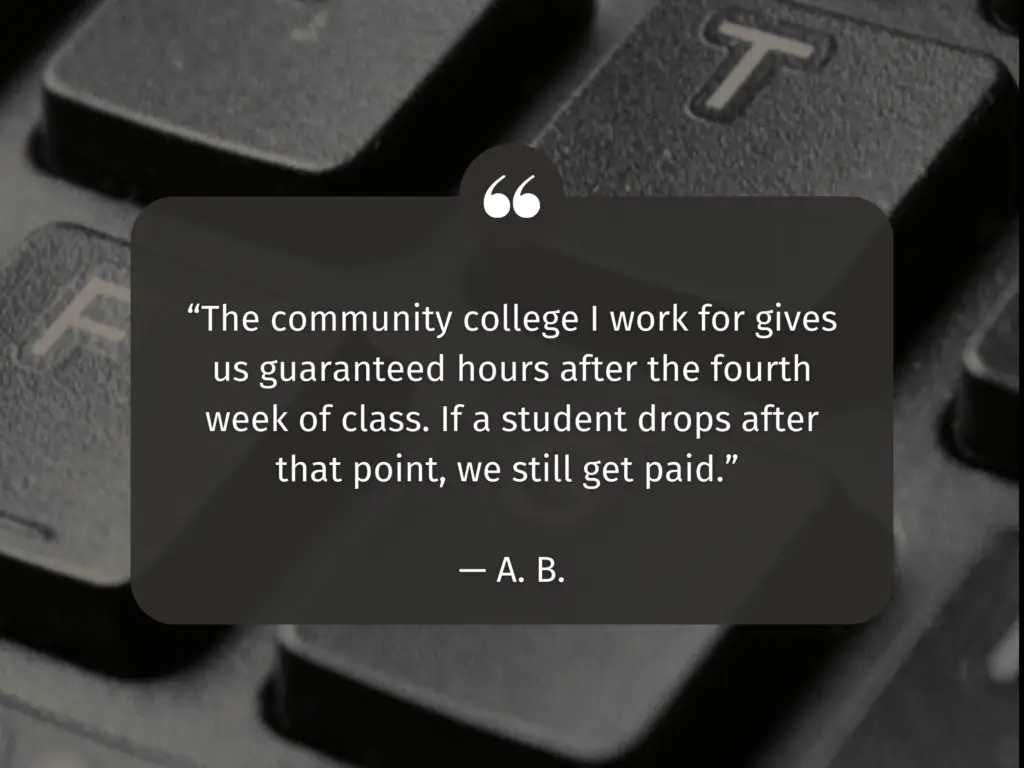Context (for new readers): Educational transcribers provide real-time communication access for students who are deaf or hard of hearing, as well as others who benefit from a written record of classroom discussions. Most TypeWell transcribers work in educational settings—community colleges, universities, and occasionally K–12 schools—where they’re assigned to specific classes for the duration of each semester, as well as one-off jobs, meetings, or “sub” assignments.
The beginning of each school semester can be a hectic time for transcribers, service coordinators, and students alike. Students add and drop classes frequently during the first few weeks of a new semester. Many students begin with a heavy course load and scale back as they settle into a routine.
For transcribers, this unpredictability can be costly. It can be challenging for transcribers to make financial or scheduling commitments—such as arranging childcare or turning down other work—when class assignments are frequently in flux.

What can agencies and coordinators do to retain good transcribers in a field of work with an unpredictable schedule? Should transcribers receive guaranteed compensation when classes are dropped unexpectedly?
The short answer is: It depends.
Policies vary widely across the profession. Some agencies may offer two weeks’ severance for dropped classes, or provide severance pay for all classes dropped after a certain deadline. Others only compensate transcribers for events canceled with less than 24 hours’ notice. Some schools and agencies provide no transcriber pay for dropped classes at all.
How do agencies choose the right policies? They consider a number of different factors.
Factors influencing transcriber pay for dropped classes
On-site vs. remote
Compensation for dropped classes may be more generous for on-site transcribers. Transcribers who work in the classroom have to consider the time commitment and actual commuting costs when choosing a schedule, and they may prefer to accept work assignments that cluster around one site.
For example:
Bonnie has accepted three back-to-back classes at a school that is half an hour from her house. The student drops two classes, leaving Bonnie with just a single 1-hour class. Bonnie may question whether the remaining assignment justifies the time and expense of commuting.
For some, the pay for a single on-site class may not offset the commute—especially if the hourly rate is modest. (Here’s what transcribers typically earn.) Even partial schedule changes, such as one dropped class in the middle of a cluster, can create unproductive gaps that are difficult to fill.

Now imagine that the student drops only the second class of the day, leaving Bonnie with an hour between two assignments. Bonnie may not be able to fill that block of time with a class on a different campus; the commute might be too long to allow her to return in time for her third class.
Remote transcribers don’t have to factor in commute time, which can make it easier to adapt quickly when schedules change — a key advantage of remote work for many.
Employee vs. contractor
Transcribers who report that they receive semester-long severance for dropped classes are more likely to be full-time employees of a school or agency. Freelance transcribers typically don’t receive severance, but they often have greater flexibility in setting their rates and diversifying income sources.

The client contract
Whether the school or agency has agreed to cover costs for dropped classes is typically outlined in the service contract — and it’s a key factor in determining transcriber compensation.
In most cases, if the agency isn’t reimbursed, it can’t pass along payment to the transcriber. Many agencies operate on very narrow margins and simply can’t absorb the cost of unrendered services.
Furthermore, limited special education budgets may restrict how schools allocate taxpayer funds, especially for services that were not ultimately delivered. The contract usually defines not only whether cancellations are billable, but also how much notice is required.

Industry norms
Sign language interpretation provided the model for live transcription services, and transcribers are typically scheduled and compensated the same way sign language interpreters have. Standard contract practices in the sign language interpreting field often include minimum billing rates, mileage reimbursement, and last-minute cancellation fees.
How can transcribers adapt when classes are dropped?
In practice, many transcribers report using creative strategies to supplement their schedules, such as:
- Pivoting to campus tutoring or academic support roles
- Taking on video captioning work during off-peak terms
- Building contracts with multiple agencies to diversify assignments
- Adding redundancy to their schedules, anticipating that some cancellations are likely
- Working only with institutions that have stricter drop deadlines or more predictable patterns of student attrition

There’s no universal standard for transcriber pay for dropped classes. Clear policies, transparent expectations, and fair compensation can help retain skilled professionals in the field.
Tell us what you think!
Does your organization have a clear, consistent, and sustainable policy for compensating dropped classes?
Fill out this short form to tell us more about the policies at your agency or institution.


